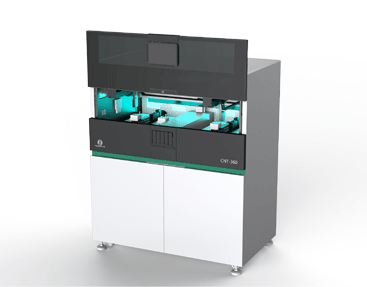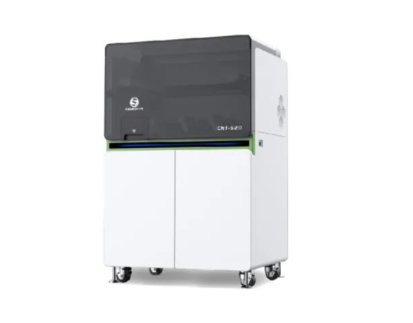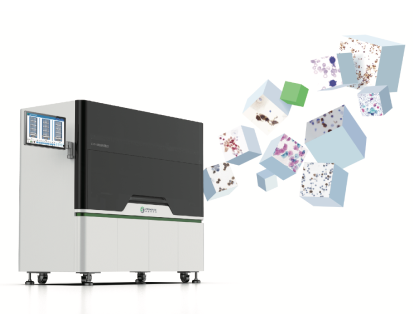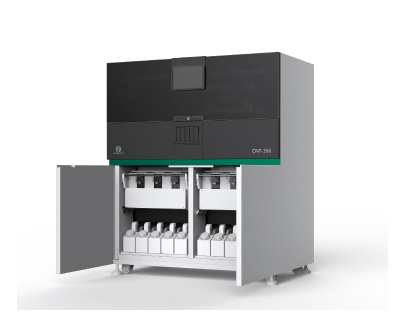Immunohistochemistry Stainer Insights: What Makes the CNT 360 Stand Out

By admin
Applications of Immunohistochemistry Stainers
Clinical Pathology
Cancer Diagnosis
Immunohistochemistry stainers are very important tools in clinical diagnosis for finding different kinds of cancer. Pathologists hunt for specific proteins in tissue samples to distinguish between tumors that are safe and those that are hazardous. Scientists can identify hormone receptors to assist them determine the best strategy to treat breast cancer, such as through hormone therapy. It’s also possible to find the cause of cancers that have spread with IHC, which makes treatment plans much easier to make. Because of this, the accuracy of immunohistochemistry staining is very important for better patient results and making sure that therapeutic approaches are tailored to each patient.
Infectious Diseases
It is also very important to use immunohistochemistry to find contagious diseases. We can use antibodies that bind to pathogen-specific proteins to help IHC find bacteria, viruses, and fungus in tissue samples. And this is the best way to find germs that are hard to grow or find any other way. For example, immunohistochemistry can find viral spots in tissue samples. This helps doctors figure out what kinds of illnesses people have, like herpes simplex virus and cytomegalovirus. Scientists can quickly and correctly find dangerous substances with IHC. This helps them take better care of their patients.Scientists use IHC to quickly and accurately find harmful agents, which helps them give better care to their patients.
Chronic Conditions
Immunohistochemistry stainers are useful for more than just cancer and infectious diseases. Long-term illnesses can be diagnosed and monitored using them as well. By looking at how certain proteins are expressed, pathologists can learn more about inflammation disorders, autoimmune diseases, and other long-term illnesses.In people with inflammatory gut diseases like Crohn’s disease and ulcerative colitis, IHC is used to check the amounts of biomarkers. Better patient care and better control of chronic illnesses come from knowing more about how illnesses get worse and which treatments work best.
Research Laboratories
Advancements in Drug Development
Immunohistochemistry stainers are very important in research labs for making progress in drug creation. By getting a close look at tissue samples, scientists can see how new drugs work at the cellular and molecular levels. In early studies, IHC is very useful because it helps figure out how drugs work and see how target molecules are produced.This makes it easier to find possible treatment targets and speeds up the process of making new medicines.To study and make new drugs, IHC is very helpful because it lets scientists see how drugs work together in tissue models.
Genetic Research
Researchers can use this method to look at how genes are expressed and the proteins they make in the setting of tissue design.When scientists use IHC, they can see how gene expression is spread out in space and how that changes appearance. This is very important in oncology because mutations and changes in genes play a big role in how cancer grows. Immunohistochemistry helps us figure out how genes cause diseases, which is very important for creating effective medicines.
Benefits of Using CNT 360 in Labs
Enhanced Accuracy and Reliability
One of the primary benefits of using the CNT 360 immunohistochemistry stainer is its enhanced accuracy and reliability. Smart formulas in the machine make sure that the right amount of chemicals are used and that the coloring is always of the same quality. This makes it less possible that mistakes will happen, so the results are more accurate and can be used again. It’s important to get the staining right for the right analysis of tissue samples, and the CNT 360 does a great job of giving pathologists and academics results they can trust.
Improved Workflow and Time Management
The CNT 360 significantly improves workflow and time management in laboratories. Because it’s automated, lab workers can focus on more important jobs without having to do as many things by hand. Because the stainer has a high processing capacity, it can process many samples at once, which cuts down on response times. This speed is especially helpful in labs with a lot of samples that need to be processed quickly and correctly. The CNT 360 makes the lab more productive and efficient by improving operations.
Cost-Effectiveness
In addition to its technical benefits, the CNT 360 is also good for scientists because it saves them money. Automating coloring processes cuts down on the waste of chemicals and the cost of work that comes with doing them by hand. Because the stainer works so well, tests don’t have to be done over and over, and less money is spent on fixing problems and making corrections. This makes the CNT 360 not only a good stainer but also a smart financial choice for labs.
Factors to Consider When Choosing an Immunohistochemistry Stainer
Ease of Use and Training Requirements
When selecting an immunohistochemistry stainer, ease of use and training requirements are critical factors. The CNT 360 is designed with an intuitive touchscreen interface that simplifies operation and programming, making it accessible even for users with minimal training. However, it’s important to consider the learning curve and the level of support available from the manufacturer. Ensuring that the lab staff can efficiently operate the stainer will maximize its benefits and streamline laboratory processes.
Sample Capacity and Throughput Rate
Another important consideration is the stainer’s sample capacity and throughput rate. Laboratories with high volumes of samples will benefit from the CNT 360’s ability to process multiple samples simultaneously. Assessing the throughput rate is essential to ensure that the stainer meets the lab’s needs without causing bottlenecks in workflow. A high-capacity, efficient stainer can significantly boost productivity and reduce sample processing times, making it an invaluable asset for busy labs.
Maintenance and Service Support
Choosing an immunohistochemistry stainer also involves evaluating maintenance requirements and service support. The CNT 360 is known for its robust design and reliability, but regular maintenance is necessary to ensure optimal performance. It’s crucial to consider the availability of service support and the ease of obtaining replacement parts. A stainer backed by strong customer support ensures minimal downtime and continuous operation, which is vital for maintaining lab efficiency and productivity.
Celnovte CNT360 Full-automatic IHC&ISH Stainer
Introduction of CNT360 Full-automatic IHC&ISH Stainer
Celnovte Biotech is dedicated to the development of pathology in China, mastering core technologies, forming a series of products, and creating a complete platform of “reagents” + “instruments”. The independently developed fully automatic immunohistochemistry staining machine CNT360 pursues the ultimate in new intelligent manufacturing, with diversified innovations such as accelerated staining, increased throughput, and intelligent interconnection. It also features independent temperature control, a large number of reagent positions, full-process monitoring, and environmentally friendly design, all of which contribute to the construction of an intelligent and efficient pathology department.
6 advantages of CNT360 Full-automatic IHC&ISH Stainer
High Throughput
The CNT360 M1 model has a sample capacity of 60 per round, while the CNT360 M2 model can handle 120 per round. This allows for real-time specimen reception in the department, keeping up with demand and meeting future staining needs as the number of slides increases.
Faster Speed
With four mechanical arms and eight fluid paths, each performing its own task in coordination, waiting for reagent addition is avoided. The use of our self-developed ultra-sensitive secondary antibody shortens incubation time. With a throughput of 120 slides, each round takes only 2.5-3 hours, providing high throughput in a short time.
Dual Temperature Control
The reagent compartment is kept at a low temperature to prevent changes in reagent potency, ensuring more stable results. The reaction environment is kept constant, unaffected by any experimental environment, ensuring consistent staining results.
Continuous Loading and Immediate Sampling
With its large throughput, the machine is light and flexible. It has eight independent staining racks that can run multiple staining programs simultaneously without interference. The cyclic operation allows for immediate sampling of emergency specimens, achieving immediate staining upon arrival.
Multifunction
The machine supports immunohistochemistry, frozen immunohistochemistry, multi-color immunohistochemistry, multiple fluorescence immunohistochemistry, chromogenic in situ hybridization, p16/ki-67 double staining, and more. It offers comprehensive functionality, meeting various pathological testing needs with a single instrument and can be customized to specific requirements.
Intelligence
The machine comes standard with a desktop computer and tablet. The portable tablet allows for remote control, eliminating the need to stay beside the machine. Voice reminders keep you updated on the machine’s operation at all times.
Efficient IHC Stainers of Celovte
After years of independent research and development, Senot Biotech has launched four fully automatic immunohistochemistry stainers, CNT300, CNT330, and CNT360 [M1 type/M2 type], in response to market demand. With technical accumulation and domestic craftsmanship, these machines have been continuously upgraded to meet different pathological needs, contributing to the development of pathology in China.
Future Trends in Immunohistochemistry
Technological Innovations on the Horizon
There will be a lot of cool new technologies in the future of immunohistochemistry. IHC staining and reading are about to change a lot because of progress in digital pathology and AI-driven picture analysis. Artificial intelligence programs can help find trends and outliers that a person might miss, which makes diagnostic accuracy better. Adding digital pathology systems also makes it possible for doctors to speak with each other and make diagnoses without being in the same room. This removes geographical obstacles and makes it easier for people to get specialized help. These new technologies will raise the standards of immunohistochemistry even more.
Predicted Developments in Pathology Practices
Looking ahead, pathology practices are expected to see significant developments driven by the advancements in immunohistochemistry. Molecular tests that are accurate and thorough will be very important for the growing field of personalized medicine. IHC is at the front of this field. Better labeling methods and antibody creation will help us learn more about how diseases work and what drugs might work on them. Cutting-edge immunohistochemistry stainers like the CNT 360 are helping pathology practices change in ways that make the future look bright. In this future, diagnoses and patient care will be more accurate and tailored to each person than ever before.










![Senot Biotech has launched four fully automatic immunohistochemistry stainers, CNT300, CNT320, CNT330, and CNT360 [M1 type/M2 type], in response to market demand.](http://www.celnovte.com/wp-content/uploads/2024/06/图片4.png)


